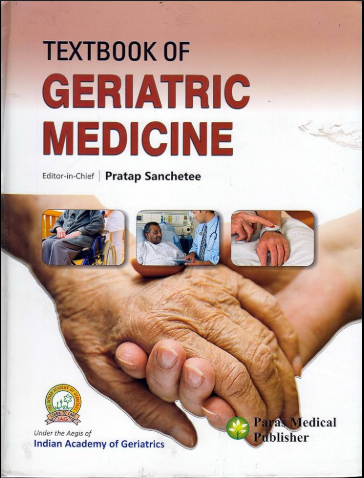The Role of Geriatrics Textbooks in Modern Healthcare
As the global population ages, the demand for specialized healthcare services for older adults continues to grow. Geriatrics, the branch of medicine that focuses on the care of the elderly, plays a critical role in meeting this need. Geriatrics textbooks have become essential tools for healthcare professionals, students, and educators, offering in-depth knowledge and evidence-based practices to improve the quality of life for older individuals. In this article, we’ll explore the importance of geriatrics textbooks in modern healthcare, the key topics they cover, and how they contribute to the advancement of care for the aging population.
Why Geriatrics Textbooks Are Crucial in Modern Healthcare
1. Addressing the Aging Population The elderly population is increasing at a rapid pace worldwide, leading to a rise in age-related diseases and conditions. Geriatrics textbooks provide healthcare professionals with comprehensive knowledge on the unique needs and challenges faced by older adults. With a deep understanding of geriatric conditions, healthcare providers are better equipped to offer appropriate treatment plans, manage chronic diseases, and improve overall patient outcomes.
2. Improving Knowledge and Competency in Geriatrics While most medical students receive some exposure to geriatrics during their training, it is often not enough to fully prepare them for the complexities of elderly care. Geriatrics textbooks fill this gap by offering specialized knowledge on topics such as frailty, dementia, palliative care, and polypharmacy. By using these resources, healthcare providers can enhance their competency in caring for older adults, ensuring they are better equipped to meet the unique challenges of this patient population.
3. Providing Evidence-Based Practices Geriatrics textbooks serve as a repository of evidence-based practices, clinical guidelines, and treatment protocols. These books compile research studies, case reports, and clinical experiences that can guide healthcare professionals in making informed decisions. The integration of evidence-based practices into elderly care not only improves patient outcomes but also helps to standardize care across various healthcare settings.

Key Topics Covered in Geriatrics Textbooks
1. Age-Related Physiological Changes One of the key areas geriatrics textbooks address is the physiological changes that occur as people age. As individuals grow older, their bodies undergo significant changes that affect their physical, mental, and emotional health. Geriatrics textbooks provide a detailed understanding of these changes, including alterations in cardiovascular, musculoskeletal, and neurological systems. This knowledge is essential for healthcare providers to accurately diagnose and manage age-related conditions.
2. Chronic Disease Management Older adults often have multiple chronic conditions that require careful management. Geriatrics textbooks cover the treatment and management of common conditions such as diabetes, hypertension, osteoarthritis, and heart disease. They also discuss the challenges of managing multiple conditions simultaneously, a situation known as multimorbidity. These resources help healthcare providers develop personalized care plans that address the complex needs of older patients.
3. Cognitive Disorders and Dementia Cognitive decline is a significant concern for older adults, with conditions like Alzheimer’s disease and other types of dementia affecting millions of people worldwide. Geriatrics textbooks offer comprehensive guidance on the identification, diagnosis, and management of cognitive disorders. They also provide information on therapeutic interventions, behavioral management, and strategies to improve quality of life for both patients and their caregivers.
4. Palliative and End-of-Life Care Palliative care is an essential component of geriatrics, focusing on providing comfort and improving quality of life for patients with serious illnesses. Geriatrics textbooks cover various aspects of palliative and end-of-life care, including symptom management, advanced care planning, and ethical considerations. Understanding these principles is crucial for healthcare professionals involved in the care of elderly patients nearing the end of life.
5. Pharmacology and Polypharmacy Older adults are often prescribed multiple medications, which can lead to complex interactions and adverse effects. Geriatrics textbooks address the issue of polypharmacy, offering guidance on safe prescribing practices, medication management, and the importance of reviewing medications regularly. By understanding the pharmacokinetics and pharmacodynamics in older adults, healthcare providers can minimize the risk of drug interactions and improve patient safety.
View more on Google
The Impact of Geriatrics Textbooks on Healthcare Professionals
1. Enhancing Patient-Centered Care Geriatrics textbooks emphasize the importance of patient-centered care, which takes into account the individual needs, preferences, and values of older adults. By learning from these resources, healthcare providers can develop stronger communication skills and build trust with elderly patients. This approach leads to better patient satisfaction, improved health outcomes, and a more holistic approach to care.
2. Training Future Healthcare Leaders Geriatrics textbooks are vital resources for medical students, nursing students, and other healthcare trainees. These books provide a solid foundation in geriatric medicine, ensuring that future healthcare professionals are well-prepared to handle the challenges of aging populations. By incorporating geriatrics education into medical curricula, healthcare institutions can help foster a generation of healthcare providers who are knowledgeable and compassionate in their approach to elderly care.
3. Supporting Evidence-Based Decision Making With the wealth of research and clinical data included in geriatrics textbooks, healthcare professionals are empowered to make evidence-based decisions. These books not only inform clinical practice but also help in shaping healthcare policies, ensuring that treatment protocols and guidelines are grounded in solid evidence.
Conclusion
In the face of an aging global population, geriatrics textbooks play an essential role in modern healthcare. These resources offer invaluable insights into the unique needs of older adults, providing healthcare professionals with the knowledge and tools necessary to deliver high-quality, patient-centered care. By addressing key topics such as chronic disease management, cognitive disorders, palliative care, and pharmacology, geriatrics textbooks ensure that healthcare providers are equipped to handle the complexities of elderly care.
As the demand for geriatric care continues to rise, these textbooks will remain crucial in shaping the future of healthcare, training the next generation of healthcare providers, and ultimately improving the lives of older adults.
Learn more about dental books

